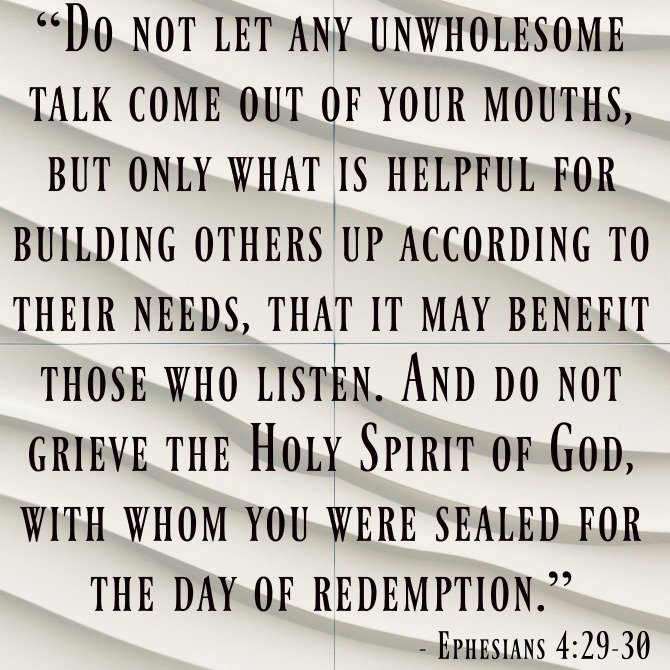I’ve found that when I’m paying attention, I tend to go through seasons when God is speaking openly and directly to me about a specific topic. Lately, the Lord has been teaching me about the power of words. This passage from Ephesians 4 has crossed my path on numerous occasions this month, and I took it as a divine nudge to make it my focus verse for August.

This is a fairly well-known and oft-recited verse in Christian circles, but in the past I’ve tended to interpret it as an admonition against swearing. Since that’s never been a problem area for me, I’ve been quick to write the verse off as relevant for all those “sinners who swear like sailors”—but not for me. (Clearly we were dealing with some pride issues here, but I digress. . . .) As I’ve matured in my faith, God has shown me that “unwholesome talk” applies to so much more than curse words.
Our church just wrapped up a sermon series on Guardrails—systems we put in place in order to minimize the damage caused when we stray into dangerous territory. Our pastor dedicated one Sunday to discussing the guardrails we establish around our words. He reminded us that words are powerful and that they the have the potential to control the direction and quality of our lives, and the lives of those around us. Our words can be a gift, but they can also be a weapon. They can build others up, or tear them down. And a few harshly spoken phrases can demolish the good fruit cultivated by years of well-chosen words.
Our pastor concluded the sermon with an exhortation to exercise caution with our words. This is especially important in times of heightened emotion, when we need to remember to respond thoughtfully rather than lashing out in anger and wielding the power of our tongue in ways we will later regret. He reminded us that before we speak we should always ask, “what does love require me to say?” This will quickly put the kibosh on hateful or harmful speech.

This message left me deeply convicted on numerous levels. As a blogger, I recognize that my written words are not irrelevant; it’s important to me that the words I share here with you are beneficial, uplifting, and true. Also important are the words I speak to those around me—especially my loved ones, as they are the most likely recipients of my hurtful and unconsidered words. This may mean holding my tongue when it would be easier to dish out an unkind “truth,” and it will almost always require a bit of careful deliberation on my part before engaging in tough conversations.
Beyond these interpersonal applications, I’ve been thinking about times when I use words that seem inoffensive but are not. Casual gossip, griping about a frustrating situation, and complaining about small nuisances are just a few instances that come to mind. These are all areas of speech that are not directly harming anyone, so it’s easy to pass them off as benign. But the enemy uses these negative words to tear me down, poisoning me from the inside out.
I believe that these principles apply to more than just our spoken words, but also to our thoughts. My tendency is to speak cruel, demoralizing words to myself to the point where I buy into the negativity. These crippling messages are NOT helpful or beneficial, and they do not serve to build me up. This month, as I focus on speaking words that are edifying and filled with God’s truth, I am remembering to apply these practices to my inner dialogue, too.
The last part of this passage points us to the ultimate WHY of using beneficial words. The New Living Translation says, “Remember, he has identified you as his own, guaranteeing that you will be saved on the day of redemption.” We are His beloved children, and we should act in a manner that represents His holiness. We do this when we surrender our words to Him, capturing our thoughts and making our subsequent words obedient to Christ.
